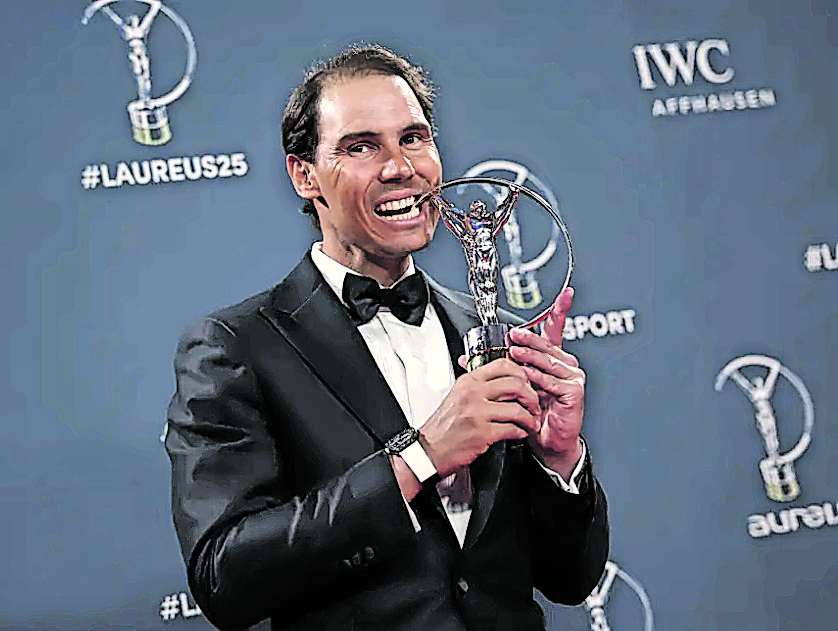Red carpet: South African billionaire Johann Ruper
What happens to a grand idea when its visionary steps away?
That’s the quiet question being asked around the 25th edition of the Laureus World Sports Awards — held this year in Madrid, Spain — an evening of glitz, legends and lofty ideals.
But missing from the spotlight was the man without whom the Laureus project might never have come to life — the South African billionaire Johann Rupert.
Rupert, who co-founded Laureus in 1999 through Richemont — the Swiss luxury goods company he chairs — was nowhere to be seen at this year’s silver jubilee celebration. For an awards body frequently dubbed “the Oscars of sport”, his absence was hard to miss.
Whispers rippled through the VIP rooms and media pits: “Is Rupert done with Laureus?”
There’s no doubting the legacy of the awards.
“The brainchild of Johann Rupert and the power of our founding patron Nelson Mandela, Laureus continues to impact communities around the world,” said Laureus ambassador and All Blacks great Sean Fitzpatrick.
That impact is measurable — over €150 million raised since inception, with 300 social programmes in more than 40 countries reaching close to six million young people.
But legacies require ongoing investment — and not just financial. The question is whether Rupert, 74, still has the drive to carry the Laureus vision forward.
In Madrid, the celebration was full of heartfelt moments. Olympic pole vault superstar Mondo Duplantis, who claimed the Sportsman of the Year award, kept it simple: “Sports are the shit,” he said bluntly to the Mail & Guardian.
But behind the swagger was sincerity: “There is nothing in the world that still has the power to unite the world like sport.
“It mobilises the youth and helps so many to aspire to more.”
Spanish tennis icon Rafael Nadal, this year’s Laureus Sporting Icon, didn’t hold back in crediting Rupert.
“Thank you to Mr Rupert for having the inspiration to create something that has lived on for as long as it has — giving hope to so many people, especially those that did not have the opportunities that I, and so many others at these awards, have enjoyed.”
For many, Laureus’ soul lives in its Sport for Good Foundation, not the red carpets or celebrity panels.
Programmes in South Africa, Brazil, India and across Europe focus on conflict resolution, gender equality, education and health — using sport as a gateway to change.
Laureus has often claimed 94% of its spending goes directly to grassroots initiatives, with only a fraction used for high-gloss ceremonies.
But it’s precisely this glossy juxtaposition — Armani suits on one end, muddy soccer boots in a township on the other — that fuels debate about the awards’ future. Is this the best way to fund social development through sport? Would the money spent flying celebrities to Madrid be better deployed elsewhere?
 Tennis legend Rafa Nadal.
Tennis legend Rafa Nadal.
Surfer legend Kelly Slater, a five-time Laureus recipient, tried to strike a balance.
“There’s a lot of awards based on popularity among the public but what makes this so special and offers it continued relevance is the fact that it’s the elite of the sporting world that decides you’re worthy,” he told the M&G.
“We all have a responsibility to spread sport and joy. I have 300 surfboards that I will eventually give away. Sport is such a simple thing to offer communities.”
Indeed, the awards remain unique in their format. Winners are chosen by the Laureus World Sports Academy, a panel of legendary athletes who carry both credibility and continuity. But institutional legacy alone can’t guarantee survival.
Much of the concern hinges on the future of Richemont’s commitment. Since 2000, the company has bankrolled the awards, using its luxury clout to pull in partners like Mercedes-Benz and Nike. These relationships have been instrumental in making the Laureus brand synonymous with both prestige and purpose.
But Johann Rupert’s appetite for such public philanthropic spectacles is famously unpredictable. He is known to avoid the limelight and is deeply private — which makes his absence at the 25th anniversary potentially more than symbolic.
Sources close to the organisation say there’s no formal sign of withdrawal yet. But Laureus insiders admit privately that the path forward is uncertain without Rupert’s personal buy-in.
Is this a vanity project approaching its natural end? Or is it a global institution ready to evolve beyond the influence of its founder?
A quarter-century in, that’s the tension Laureus now must wrestle with. For every programme pulling kids off the streets through sport, there’s a champagne toast in Madrid that raises questions about focus and sustainability. Yet the core belief — that sport can unify, uplift and inspire — remains powerful.
“I don’t know if there is anything more impactful than sport in bringing us all together,” Duplantis said.
The hope is that the structures behind Laureus can do the same — even if its founder eventually fades from view.
What happens when a legacy becomes a burden? Laureus may be about to find out.